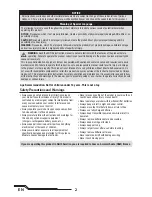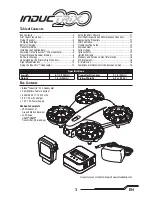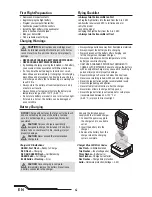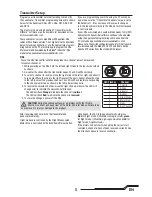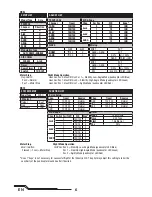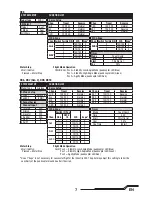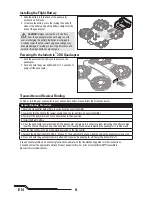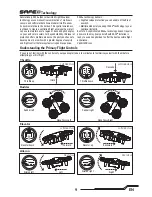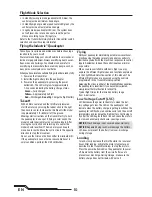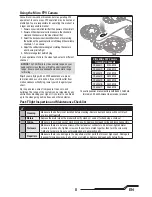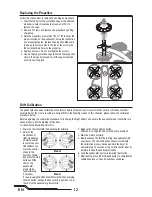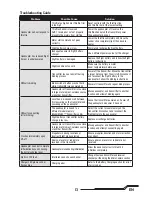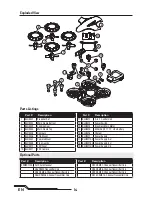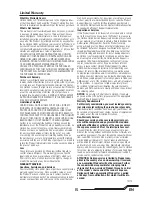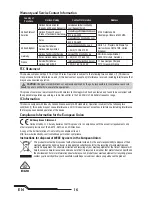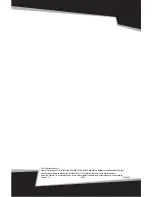
10
EN
• In stability low angle mode (quadcopter LED blue), the
controls provide a minimum bank angle.
• In stability high angle mode (quadcopter LED green), the
controls provide a maximum bank angle.
• In agility mode (quadcopter LED red), the system does
not self level. Use rates and expo to tune the perfor-
mance according to your fl ying style.
Refer to the
Transmitter Setup Table
for transmitter switch
selection and specifi c setup information.
Flight Mode Selection
Consult your local laws and ordinances before choosing a
location to fl y your aircraft.
We recommend fl ying your aircraft outside in calm winds or
inside a large gymnasium. Always avoid fl ying near houses,
trees, wires and buildings. You should also be careful to
avoid fl ying in areas where there are many people, such as
busy parks, schoolyards or soccer fi elds.
When you have located a suitable fl ying site and are ready to fl y:
1. Power on the transmitter.
2. Install the fl ight battery into the quadcopter.
3. Power on the quadcopter by pressing the power
button/LED. The LED will glow for approximately
1-2 seconds indicating the battery charge status.
Green
= Fully charged.
Yellow
= Approximately half full.
Red
= Discharged.
Do not fl y.
Charge the fl ight battery.
Takeoff
With all trims centered and the throttle fully lowered,
start the motors by moving the rudder stick to the right
then back to center. Increase the throttle until the model
is approximately 2 ft. (600mm) off the ground.
Making small corrections on the transmitter, try to hold
the quadcopter in one spot. If fl ying in calm winds, the
model should require almost no corrective inputs. After
moving the cyclic stick and returning it to center the
model should level itself. The model may continue to
move due to inertia. Move the cyclic stick in the opposite
direction to stop the movement.
Do not use the trims on the transmitter to eliminate drift.
If the quadcopter does not hold a reasonable hover in
calm conditions, perform the
Drift Calibration
.
Flying
With your quadcopter maintaining a stable low-level hover,
practice using the rudder, elevator and aileron controls to
familiarize yourself with the machine’s responses to control
inputs. Remember to keep the control inputs as minimal
as possible.
When you are comfortable with basic fl ight you may
explore the different fl ight modes and functions explained
in the
Flight Mode Selection
section of this manual. The
different fl ight modes are accessed using the controls
programmed in the
Transmitter Setup
section.
Releasing the sticks in either of the Stability Modes will allow
the quadcopter to level itself. If you become disoriented,
slowly lower the throttle stick to land softly.
Typical fl ight times for the included battery range
from 5-6 minutes.
Low Voltage Cutoff (LVC)
LVC decreases the power to the motors when the bat-
tery voltage gets low. The LED on the quadcopter will
indicate when the battery charge is getting low. When the
quadcopter LED fl ashes red continuously, land the aircraft
immediately and recharge the fl ight battery. Continuing to
fl y after the LED begins to fl ash red will cause the motors
to slow and eventually shut down, causing a crash.
NOTICE:
Crash damage is not covered under warranty.
NOTICE:
Repeated fl ying to LVC will damage the battery.
LVC does not prevent the battery from over-discharge
during storage.
Landing
To land, slowly decrease the throttle while in a low-level
hover. After landing, activate the motor stop feature, as
described in the
Transmitter Setup,
to stop the motors.
Press the power button/LED on the quadcopter to power
off. Remove the battery from the aircraft after use to
prevent over discharge. During storage, make sure the
battery charge does not fall below 3V per cell.
Flying the Inductrix
™
Quadcopter


